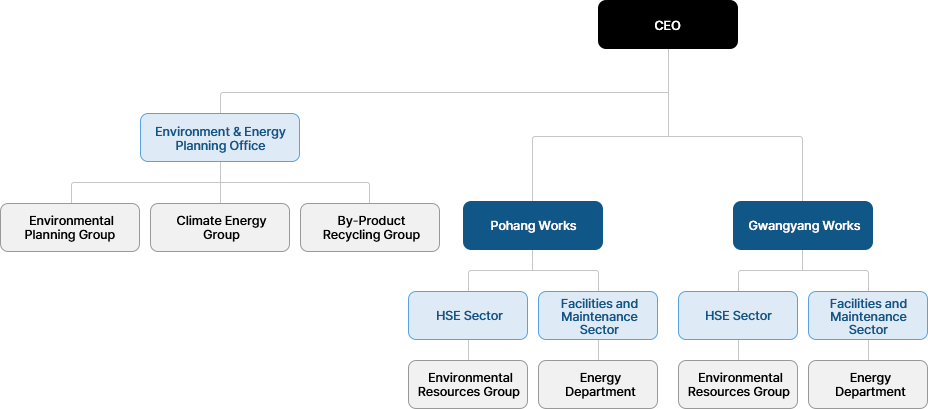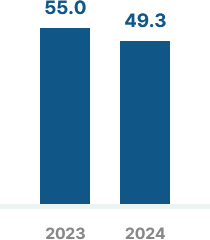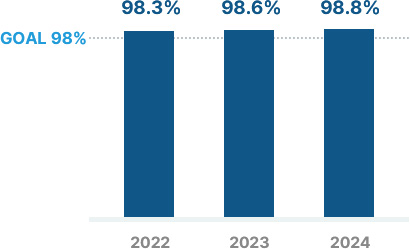Environmental Management System
Organization
POSCO’s environmental initiatives are led by the Environment & Energy Planning Office, as well as the Environmental Resources Group and the Energy Department at each steelworks. Updates on environmental and risk management efforts are regularly submitted as reporting items to the monthly management briefing chaired by the CEO. The Environment & Energy Planning Office at POSCO is placed under the direct supervision of the CEO to ensure accountable management and prompt decision-making on environmental issues. The office establishes mid-term environmental management and technology strategies on an annual basis.
At the steelworks level, the Environmental Resources Group is responsible for establishing and operating the environmental management system. Its duties include administering permits and approvals, inspecting emission control facilities, managing chemical safety training and compliance, and overseeing waste recycling operations. The Energy Department is tasked with optimizing facility operations and management to ensure a stable supply of energy resources such as by-product gas, electricity, water, and hydrogen. The department also leads efforts to reduce external energy procurement by enhancing power generation efficiency, maximizing by-product gas recovery, and promoting energy-saving initiatives across operating plants.
Environmental Advisory Committee
Since 2022, POSCO has operated the Environmental Advisory Committee to gather expert insights on the environmental impacts of areas surrounding its steelworks, improve the local environment, and strengthen community engagement. The committee meets quarterly, with additional meetings held as needed. Comprising approximately five internal and external experts, the committee discussed topics in 2024 such as the roles of regional environmental health centers and trends in environmental health policy. POSCO will continue to engage with experts and opinion leaders to proactively address environmental challenges across the organization.
Note: A total of four quarterly meetings were held in 2024.
Performance-Based Remuneration
POSCO’s CEO evaluates executives based on a combination of key performance indicators (KPIs) and critical business outcomes, and determines performance-based compensation accordingly. As part of the company’s core performance reporting, the Head of the Environment & Energy Planning Office submits monthly updates—such as total air emissions and by-product recycling rates—during the management briefing chaired by the CEO.
Board of Directors
Each year, POSCO submits the mid-term management strategy and business plan for the upcoming year to the Board of Directors for resolution. This submission includes key environmental initiatives—covering air, water, waste, land, and chemicals—as well as performance and plans related to carbon neutrality and environmental budgets (investments and expenditures). In addition, the ESG Committee provides quarterly updates to the Board on improvements in environmental and carbon management systems.
Operational Status
Management Guidelines
In January 2010, POSCO established the first environmental manual, which has since been revised and is currently implemented as the Environmental Management Manual. In addition, we operate under an environmental management policy tailored to the characteristics of the steel industry, in line with corporate regulations and internal guidelines. This policy outlines POSCO’s overarching direction and monitoring commitments in the areas of climate change, water, air, waste, and biodiversity.
ISO Certification
POSCO’s major business sites are certified to ISO 14001 and ISO 50001, the international standards for environmental and energy management. These sites undergo regular audits—annual inspections by the Ministry of Environment (MOE), internal audits by each business unit, and follow-up or recertification audits by external certification bodies. The audit results are reported to top management and are reflected in updates to the company’s environmental strategies and targets, helping maintain an effective environmental management system. To enhance objectivity and consistency in internal audits and compliance assessments, we apply structured checklists aligned with environmental management system requirements and regulatory obligations.
Position on Biodiversity
POSCO assesses the potential impact of its operations on the biodiversity of surrounding areas and implements measures to minimize any negative effects.
New Projects
When initiating new projects—including facility expansions or additions—POSCO is committed to preventing and minimizing threats to biodiversity. Where unavoidable, we will restore affected areas and implement offset measures. We will assess and monitor potential impacts on ecosystems through biodiversity surveys and mitigation efforts. This commitment extends beyond our own operations to include both primary and non-primary supply chains.
We recognize international conventions related to the protection of biodiversity and land,1) and we commit to complying with all applicable national and local legal requirements at our operational sites within these areas. If our operations result in damage, loss, or degradation within areas protected under international conventions, we will restrict access to the site and conduct a thorough review. For projects involving natural or critical habitats, we will seek to avoid adverse impacts by minimizing net losses, revising plans, or exploring alternative locations.
Before undertaking new projects, we will conduct environmental impact assessments in compliance with applicable laws and regulations, and proactively identify and mitigate risks to biodiversity, including threats to endangered species. We are committed to ensuring that our operations do not compromise biodiversity values—such as ecosystems and critical habitats—and we will engage in consultation with local residents and communities regarding land use.
1)The conventions refer to the Convention on Biological Diversity, the Ramsar Convention, and the Convention Concerning the Protection of the World Cultural and Natural Heritage. We also refer to the guidelines of the International Union for Conservation of Nature (IUCN), including the Protected Area Categories Guidelines and the Guidelines for Planning and Monitoring Corporate Biodiversity Performance.
Worksite Management
For business sites that include key biodiversity habitats, POSCO is committed to achieving “No Net Loss” and striving toward a “Net Positive Impact.”
At the Pohang and Gwangyang Works, we will conduct environmental assessments of marine water and low-quality soil surrounding the steelworks, alongside ongoing monitoring to enhance the local ecosystem. When needed, we will collaborate with expert institutions to carry out specialized studies on potential impacts to biodiversity.
We identify protected areas, zones of high biodiversity value, and the presence of endangered species near our business operations and project development sites. These findings inform the development, implementation, and monitoring of each project’s biodiversity management plan. For areas recognized under international conventions—such as World Heritage Sites, Ramsar Sites, or other designated conservation areas—located within or adjacent to our existing operations, we ensure that our activities do not compromise their ecological value.
Marine Ecosystem Preservation
POSCO is actively engaged in preserving marine ecosystems by identifying and recycling steel and fishery by-products as alternatives to natural resources.
One such initiative is the ongoing project to create a sea forest to restore marine ecosystems. POSCO has developed Triton® artificial reefs made from steel slag, which are rich in minerals such as iron and calcium. These reefs promote the proliferation of marine plankton and the attachment of algae spores, making them effective tools for marine restoration. To date, over 8,000 Triton reefs have been deployed in domestic waters. Furthermore, the Clean Ocean Volunteer Group, a specialized volunteer group of POSCO employees, carries out approximately 60 underwater cleanup activities each year. The company provides systematic support for biodiversity-related volunteer efforts, reinforcing its commitment to marine conservation.
Endangered Species Protection
POSCO is committed to protecting endangered species by supporting biodiversity initiatives at the local, national, and global levels. Near our operational sites, we strive to safeguard one endangered mammal, the otter, and eleven bird species—including the whooper swan, tundra swan, bean goose, brant goose, kestrel, Eurasian sparrowhawk, common buzzard, osprey, Eurasian eagle-owl, Saunders’s gull, and Far Eastern curlew. To minimize disruption to these species and preserve surrounding ecosystems, we implement a range of measures, such as creating alternative habitats, suspending construction activities during wintering periods, and installing temporary soundproof barriers. We also raise awareness and promote participation in biodiversity protection among employees and stakeholders through a range of environmental education programs.
Metrics and Targets
Atmospheric Indicators
In accordance with SPECIAL ACT ON THE IMPROVEMENT OF AIR QUALITY IN AIR CONTROL ZONES, chimney tele-monitoring systems (TMS) are installed for emission sources with emissions exceeding 3 tons of NOx/SOx and 0.15 tons of dust in the previous year.
Air Pollutant Emissions
TMS Installation Status
| Metric | Unit | 2021 | 2022 |
2023 | 2024 | 2025 Target |
|---|---|---|---|---|---|---|
| TMS Installation Status1) | count | 105 | 245 |
246 | 300 | 318 |
1)TMS refers only to the tele-monitoring systems that transfer data to the MOE. The atmospheric TMS installation schedule is subject to change depending on the progress of investment.
By-Product Recycling Indicators
In 2024, POSCO generated 20,204 thousand tons of by-products and recycled 19,951 thousand tons, achieving a recycling rate of 98.8%. POSCO is committed to maintaining a recycling rate of 98% or higher.
Our By-Product Recycling Target
Water Usage Management
POSCO manages water resources efficiently by setting annual usage targets and tracking performance. We apply these targets to all steelworks with production processes, covering the total volume of water withdrawn for industrial use.
In 2024, our target was 158 million tons, while actual usage amounted to 156 million tons—2 million tons below the target.
Water Usage: Target vs. Actual
| Metric | Unit | 2024 Targets | 2024 Results |
|---|---|---|---|
| Water Usage | tons | 158,148,304 | 156,026,930 |


